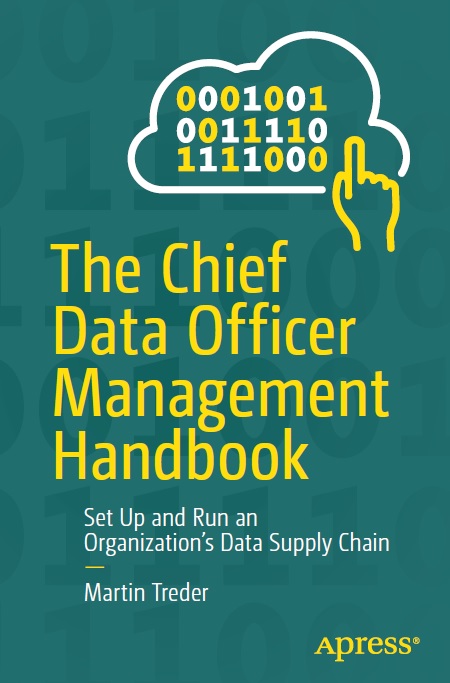By Martin Treder

Contents
About the Author vii
Acknowledgments ix
Foreword.xi
Preface xv
Introduction xvii
Part I: Designing an Effective Data Office 1
Chapter 1: Understand Your Organization 3
Chapter 2: Aspects of Effective Data Management 19
Chapter 3: The Data Supply Chain 35
Chapter 4: Data Vision, Mission, and Strategy 47
Chapter 5: Masterdata Management 61
Chapter 6: Data Governance 79
Chapter 7: The Data Language 93
Chapter 8: Data Processes 111
Chapter 9: Roles and Responsibilities 127
Chapter 10: Data Quality 139
Chapter 11: Shaping Data Office Teams 157
Part II: The Psychology of Data Management 191
Chapter 12: Typical Challenges of a CDO 193
Chapter 13: How (Not) to Behave As a CDO 213
Chapter 15: Psychology of Governance 249
Part III: Practical Aspects of Data Management 259
Chapter 16: Data Business Cases 261
Chapter 17: Data Ethics and Compliance 287
Chapter 18: The Outside World 299
Chapter 19: Handling Data 327
Chapter 20: Analyzing Data 353
Chapter 21: Data Management in Crises 383
Chapter 22: Data in Mergers and Acquisitions 391
Chapter 23: Data for Innovation 403
Appendix A: List of Theorems 419
Bibliography421
Index 425
Preface
You have opened this book for a reason. You might have been asked by your organization to bring its data handling in order. Your CEO may have become furious upon finding out that certain data is not available or that forecasts were precise but wrong. Or, watching how your organization deals with data, you might have thought that there must be a better way. Either way, you are touching on one of the most underestimated business topics of our times:
The need for a solid data foundation for all the fancy stuff that people intend to do with data. Have you ever wondered why so many organizations call data the “oil of the twenty-first century” and at the same time struggle in becoming truly data driven?
There is no simple answer to this question. Different issues contribute to this problem to varying degrees.
But understanding those factors is critical if you want to help your organization use data in a commercially successful way, both short and long term. I invite you to dive into this book and read what some of the pioneers of this discipline have found out.
But, more importantly, please reflect on what you read in the light of the organization you are working for. Hundreds of pages about Data Management are too much to read, considering your limited spare time? Don’t worry, this book is not a novel! You can start wherever you want, pick the topics you are most interested in and decide on your individual reading order. You will find a few cross-references, but none of the chapters requires you to read previous parts of the book. Enjoy!
